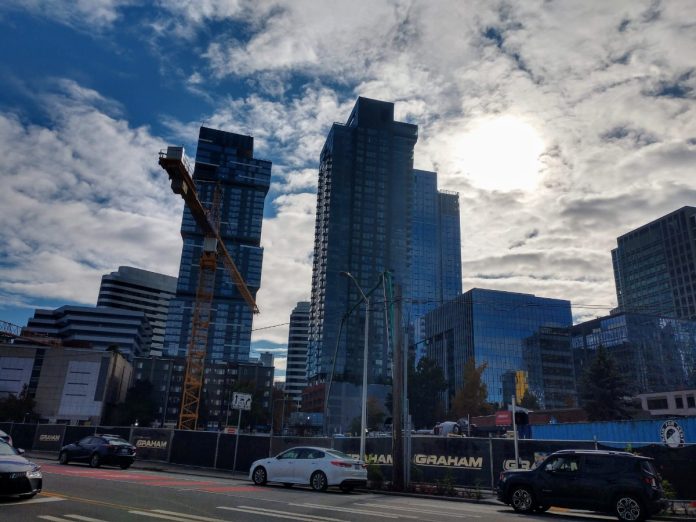This morning The Seattle Times took a look at Seattle’s parking market and did not like what they found. It appears some poor forgotten cars could be going without a roof over their heads. A relaxation of parking requirements in the densest parts of the city could be casuing this crisis of sorts. Meanwhile, Seattle also has some 11,200 people without roofs over their heads.
The poster child in this parking shortage story is The Emerald, a 40-story tower of 262 condominiums and 62 parking stalls, which apparently is the lowest ratio of any new residential tower downtown. “[T]he 62 parking spots in The Emerald — available only to owners of penthouses and two-bed, two-bath units, which start at $1.5 million — are in such high demand they’re going for as much as $100,000,” Katherine Khashimova Long wrote. That a million-dollar-condo owner would have to pay an extra $100,000 for a reserved parking stall hardly seems a crisis.
Nowhere in the story is the cost of building parking mentioned (nor climate change for that matter), but I was reminded of another Seattle Times headline from a few years back: “$100,000 per space? Costs soar for Sound Transit’s Kent park-and-ride garage.” It appears Seattle condo market has finally priced parking near its actual cost after years of being a hidden cost foisted on all residents. While the developer of The Emerald might not have the same costs per stall as Sound Transit, underground parking in Downtown Seattle clearly isn’t cheap to build. $100,000 likely isn’t far off.
What the story seems to lament is the days when parking was subsidized by all residents, regardless of whether they use it, and plentiful thanks to government mandates. In such a system, people who don’t own cars still see higher housing costs since parking costs were bundled in. The parking reforms of the last decade have weakened the socialism for cars system, but developers are still building vast sums of parking by choice–except for in a few exceptional cases the article highlights.
Overall, 1.6 million parking spots and counting exist in Seattle, according to a Research Insitute for Housing America estimate. It’s hard to see that as a shortage. Especially, if the region is serious about climate action, meeting Paris Climate Accords targets, and achieving carbon neutrality. The transportation sector overwhelmingly accounts for Seattle’s carbon footprint, and continuing to overbuild parking only feeds this destructive addiction.

The Emerald’s Marketing Director Josh Nasvik reports only about 25% of condos are reserved ahead of its summer opening, which is considered light compared to rival condominiums–one broker said a pre-lease rate of 55% was average in our condo market. However, Nasvik blamed “a molasses-like condo market,” not the relative lack of parking for The Emerald seeing a bit weaker lease-up.
Our sense of normal in Seattle may also be skewed. In a healthy housing market, we probably wouldn’t see condo buildings nearly sell out before they even open. But a decade of underbuilding housing does skew things–and parking requirements did help drive that underbuilding by driving up housing construction costs.
The Seattle City Council further eased parking requirments in 2018 in a parking reform package that increased flexibility and waived requirements in areas served by Frequent Transit Service (even if outside of Urban Villages). The majority of Seattle continues to be governed by parking requirments and single family zoning. The Seattle Times Editorial Board has generally opposed parking reform, and endorsed candidates who vowed to strengthen parking requirements, such as Councilmember Alex Pedersen.
Khashimova Long does note that Emerald residents have the option to rent stalls in nearby parking garages–Downtown Seattle is awash in them–and the Emerald arranged an agreement with the hotel next door, which has an excess of parking, to secure 20 long-term parking leases available to residents at a rate of $375 per month.
All this is to say, is there really a parking shortage problem here? Or are some real estate brokers just gloating that their competition is having to work a little harder to lease their units?
Perhaps a better society would be one that has a strong social safety net for humans rather than for cars.
Doug Trumm is publisher of The Urbanist. An Urbanist writer since 2015, he dreams of pedestrian streets, bus lanes, and a mass-timber building spree to end our housing crisis. He graduated from the Evans School of Public Policy and Governance at the University of Washington in 2019. He lives in Seattle's Fremont neighborhood and loves to explore the city by foot and by bike.


